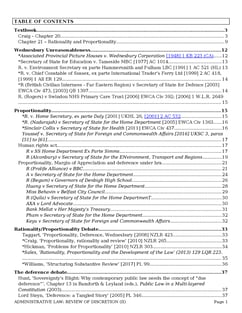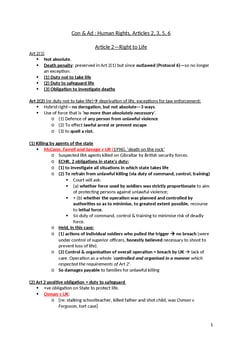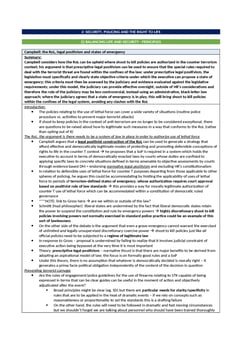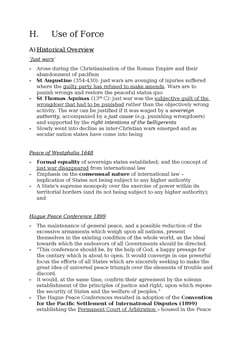R (Privacy International) v Investigatory Powers Tribunal and Others [2019] UKSC 22; [2017] EWCA Civ 1868
Judgement for the case R (Privacy International) v Investigatory Powers Tribunal and Others
Table Of Contents
KEY POINTS
Section 67(8) of RIPA (Regulation of Investigatory Powers Act) states that decisions of the IPT (Investigatory Powers Act) should not be subject to appeal or liable to be questioned in any court unless the Secretary of State provides otherwise.
Anisminic Case Precedent established that decisions could be subject to review if there were errors of law going to the merits, exceeding jurisdiction, or amounting to a nullity.
Exclusion of judicial review involves limiting the judiciary's power to assess the constitutionality or legality of certain government actions. This debate highlights the delicate balance between preserving governmental authority and upholding principles of justice and accountability.
The institutional features of the IPT, including the qualifications of its members, its autonomy, and its role in reviewing the lawfulness of intelligence services' actions, are crucial to understanding its unique status.
The IPT is considered an independent judicial body with authority comparable to the High Court, and its unique features are emphasized as justifying the exclusion of judicial review.
Parliament has the power to exclude judicial review of ordinary errors of law made by the IPT.
FACTS
-
The Appeal involved R (on the application of Privacy International) an 'Appellant" and the Investigatory Powers Tribunal ("IPT") and others ("Respondents").
The appeal revolved around a challenge to the decisions or determinations made by the IPT related to issues falling within its jurisdiction under the Regulation of Investigatory Powers Act RIPA.
The case involved a consideration of Section 67(8) of the Regulation of Investigatory Powers Act RIPA, which stated that decisions of the IPT are not subject to appeal or liable to be questioned in any court, except as provided by the Secretary of State.
The role of the IPT emphasized its duty to apply principles akin to those applied in judicial review when assessing the lawfulness of actions by intelligence services.
-
The IPT consisted of members with high judicial offices or lawyers with significant experience.
The appeal contested the intent of Parliament in conferring independence and authority upon the IPT and considered whether this legislative intent justified the exclusion of judicial review.
JUDGEMENT
-
In the judgment of the case, the majority view was in favor of dismissing the appeal.
Lord Sales delivered the main judgment, supporting the position that Parliament has the power to exclude judicial review of ordinary errors of law made by the Investigatory Powers Tribunal (IPT).
The majority concluded that Section 67(8) of the Regulation of Investigatory Powers Act (RIPA) does exclude judicial review, particularly concerning ordinary errors of law, when made by the IPT.
-
It is essential to note that Lord Wilson provided a dissenting opinion, who disagreed with the majority on legal facts.
Lord Wilson raised questions about whether Section 67(8) of RIPA completely bars judicial review of the IPT's determinations and whether Parliament had the authority to exclude judicial review of its decisions.
COMMENTARY
In the interpretation of Section 67(8) of the Regulation of Investigatory Powers Act (RIPA) and its impact on the ability to subject decisions of the Investigatory Powers Tribunal (IPT) to judicial review.
This case underscored the delicate balance between safeguarding the IPT's unique role in overseeing intelligence services and ensuring the availability of judicial review for potential legal errors.
The tension lay in defining the scope of parliamentary authority to limit the review of the IPT's determinations, particularly when it comes to ordinary errors of law.
Lord Sales
The majority, as represented by Lord Sales, held that Parliament had the authority to exclude judicial review, particularly for ordinary errors of law made by the IPT.
Lord Sales emphasized the independence and authority bestowed upon the IPT by Parliament.
Lord Wilson
Dissented, questioning the extent to which Section 67(8) precludes judicial review and whether Parliament could entirely exclude review of its decisions.
The dissenting opinion challenged the majority's stance, adding complexity to the legal interpretation of the statute.
RELATED CASES
For Further Study on R (Privacy International) v Investigatory Powers Tribunal and Others

Administrative Law notes fully updated for recent exams at Oxford an...

A collection of the best GDL notes the director of Oxbridge Notes (a...
Need instant answers? Our AI exam tutor is here to help.
Ask questions 🙋 Get answers 📔 It's simple 👁️👄👁️
Our AI is educated by the highest scoring students across all subjects and schools. Join hundreds of your peers today.
Get StartedSimilar Cases
Related Product Samples
These product samples contain the same concepts we cover in this case.


